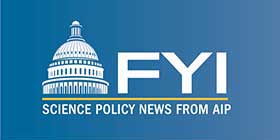Droegemeier Outlines Agenda in First Speech as OSTP Director
By William Thomas
On February 15, Oklahoma meteorologist Kelvin Droegemeier made his first public appearance as director of the White House Office of Science and Technology Policy (OSTP), addressing a large audience at the annual meeting of the American Association for the Advancement of Science in Washington, D.C.
In his remarks, he outlined a set of policy priorities while avoiding such controversial issues as President Trump’s views on climate change and proposed cuts to research budgets. Striking an optimistic tone, he said “there is literally no better time in the history of this planet or any better place on Earth to be engaging the quest for scientific knowledge and understanding than right here, right now in America.”

Droegemeier grouped his ideas for the future into three “pillars,” which he said will support a new “bold era” in science and technology. He said the first pillar involves taking a long-term, holistic view of research, and he called for a new quadrennial assessment of the U.S. R&D enterprise placed in a global context.
In addition, Droegemeier stressed the benefits of viewing R&D in terms of “thematic portfolios” that cut across research topics and disciplines. As an example, he pointed to artificial intelligence, noting it spans numerous disciplines ranging from computer science to psychology and ethics. He said this heterogeneity presently makes it difficult to answer such elemental policy questions as how much funding is dedicated to the field or how many students and researchers are working in it.
Droegemeier emphasized that thinking in terms of portfolios makes it easier to leverage the links between R&D programs, arguing, “If we do this, we’ll maximize the use of available dollars, minimize unnecessary duplication, and greatly … increase collaboration.” He did not indicate how his concept relates to the model set by current cross-cutting efforts such as the National Nanotechnology Initiative. He did say, though, it would not involve any “wholesale change” in the structure of federal research budgets.
The second pillar involves improving partnerships among actors in the federal government, industry, academia, and nonprofit sectors, focusing on “intersection points” such as data use, workforce development, and access to facilities. He also said that reforming intellectual property policies would likewise promote innovation.
Expressing a desire to “rekindle those famous blue-sky industrial research labs of the past,” Droegemeier proposed the creation of what he provisionally called “alpha institutes.” He described them as a “scientific crucible” for bringing together experts from different sectors to address challenges in areas such as space exploration, climate change, and medicine. He said the institutes would be based at universities and colleges, with funding provided “primarily” by industry and nonprofit institutions.
The third pillar comprises steps that aim to protect and empower researchers as well as safeguard their work. Droegemeier spoke extensively about the lack of diversity in the sciences and the need to combat sexual harassment, emphasizing the importance of creating “safe, welcoming, and accommodating environments for performing research.” He also expressed his desire to relieve researchers from “unnecessary and wasteful” regulatory requirements.
Droegemeier said one of his “top priorities” is to prevent the misappropriation of U.S.-funded research by “those attempting to do us harm” and “those who would seek to reap the benefits of our hard work without doing hard work themselves.” He did not name specific threats, but the federal government is currently taking steps to prevent other nations, particularly China, from capitalizing on U.S. research. These include imposing new export controls in select technology areas and barring Department of Energy employees, contractors, and grantees from participating in talent recruitment programs operated by nations deemed “sensitive.”
The author is Senior Science Policy Analyst at FYI.
FYI has been a trusted source of science policy and funding news since 1989, and is read by members of Congress and their staff, federal agency heads, journalists, and U.S. scientific leaders. Sign up for free FYI emails at their website.
©1995 - 2024, AMERICAN PHYSICAL SOCIETY
APS encourages the redistribution of the materials included in this newspaper provided that attribution to the source is noted and the materials are not truncated or changed.
Editor: David Voss
Staff Science Writer: Leah Poffenberger
Contributing Correspondent: Alaina G. Levine
Publication Designer and Production: Nancy Bennett-Karasik
March 2019 (Volume 28, Number 3)
Articles in this Issue

